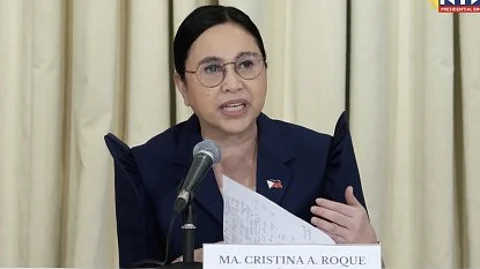
- NEWS
- the EDIT
- COMMENTARY
- BUSINESS
- LIFE
- SHOW
- ACTION
- GLOBAL GOALS
- SNAPS
- DYARYO TIRADA
- MORE

As the regulator of the cement industry, the Department of Trade and Industry will start its motu proprio probe to determine whether the increased cement imports are causing or threatening to cause serious injury to the local cement industry, as evidence obtained by the DTI says the domestic cement industry had incurred substantial losses amounting to P15 billion in 2023.
In a notice signed by Trade Secretary Cristina Aldeguer-Roque, the investigation covering cement imports from 2019 to June 2024 is classified under AHTN Codes 2523.29.90 and 2523,90.00.
According to the DTI, based on their review of evidence submitted, the volume of cement imports in absolute terms increased continuously from 2019 to 2023, which is the period of investigation.
Also, the evidence said imports increased by 10 percent in 2020, 17 percent in 2021, and five percent in 2023.
Further, the share of imports also increased from 2019 to 2023, or from 30 percent in 2019 to 47 percent in 2023, and 51 percent from January to June 2024.
Based on documentary evidence obtained by the DTI, the domestic cement industry has suffered serious injury due to increased imports. Specifically, the market share of imported cement rose from 10 percent in 2020 to 17 percent in 2021, capturing an additional 5 percent of the market in 2023.
“While the share of the domestic cement industry exhibited a declining trend from a 78-percent share in 2019 to 68-70 percent shares in 2023 and 66 percent share from January to June 2024, the domestic industry’s sales revenues declined from 2019 to 2023, from P79 billion in 2019 to P64 billion in 2023.”
The investigation, under Section 6 of the Safeguard Measures Act (RA 8800), states: “The Secretary may, motu proprio, initiate a preliminary safeguard investigation if there is evidence that increased imports of the product under consideration are a substantial cause of, or are threatening to substantially cause, serious injury to the domestic industry.”
Industry sentiments
Meanwhile, the local cement industry lauded the move of Secretary Roque of initiating a motu proprio investigation which, according to them, will promote a level playing field between importers and local manufacturers, which have been contributing to the Philippine economy through jobs creation and revenue generation for the government.
They also noted that examining safeguards for cement manufacturers aligns with the Tatak Pinoy Act, which prioritizes the use of Philippine-made products in public projects.
“The investigation is likewise consistent with the Government Procurement Reform Act, one of the Marcos administration’s legislative priorities. The probe is not protectionist; imports will still be allowed, but this approach addresses the unfair advantage that imported products often receive from government subsidies in their countries of origin,” an industry player said.
With the passage of Republic Act 11981, or the Tatak Pinoy (Proudly Filipino) Act, earlier this year, government projects and procurements are encouraged to utilize locally made materials that meet Philippine national standards, making them better suited to the country’s climate and geological conditions.
